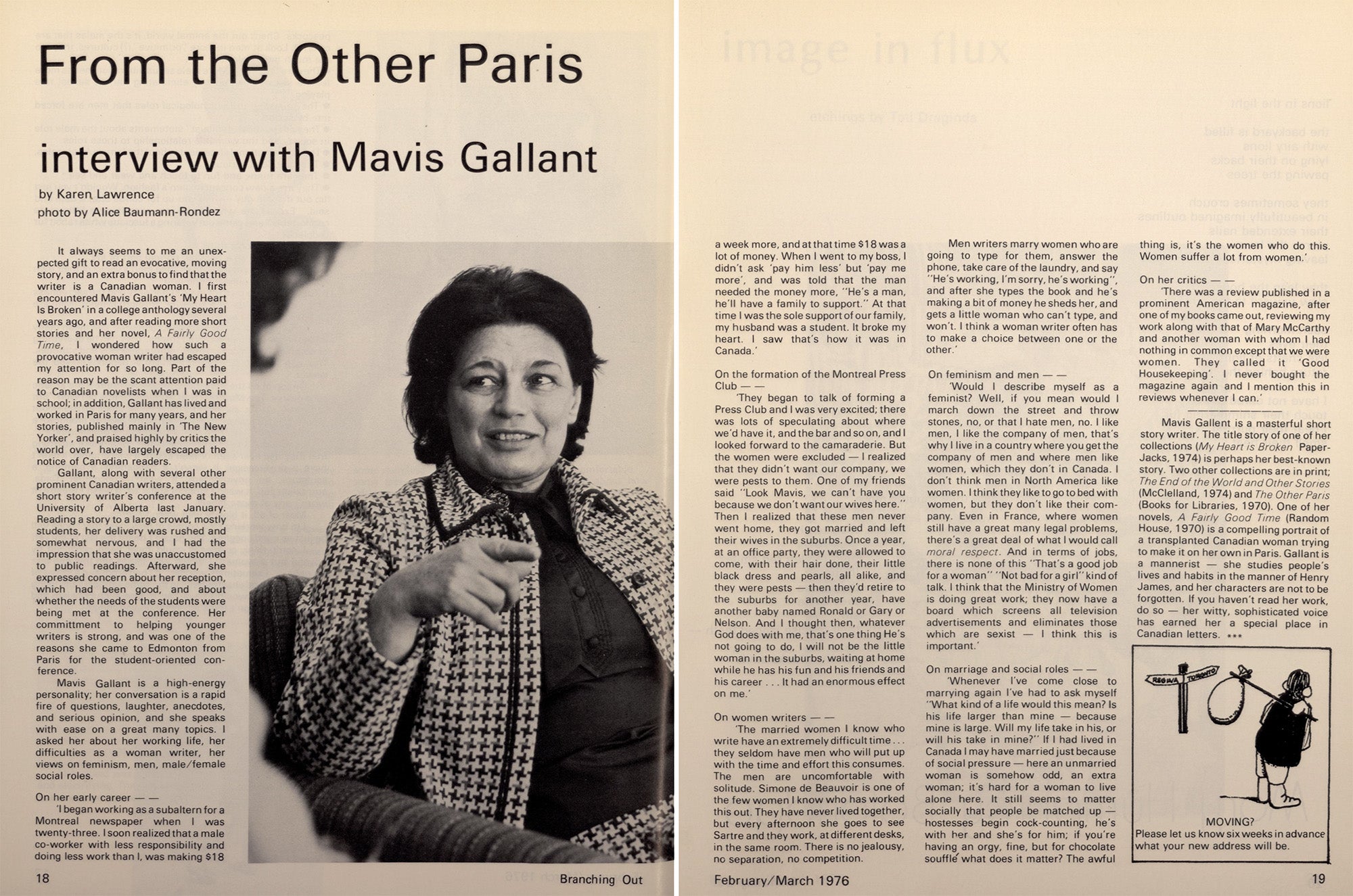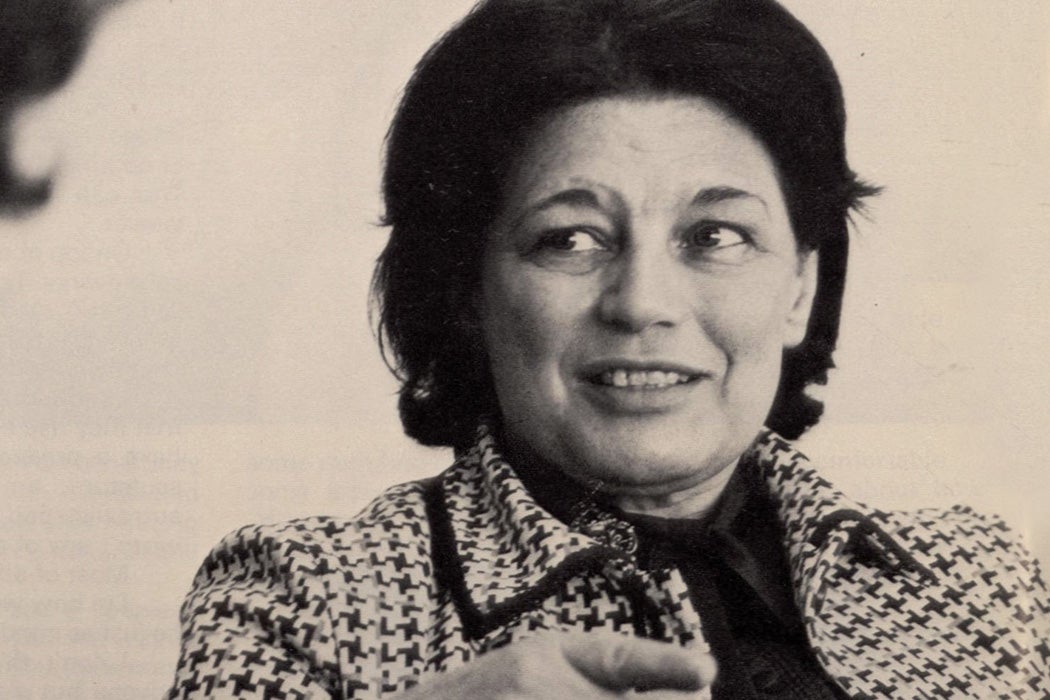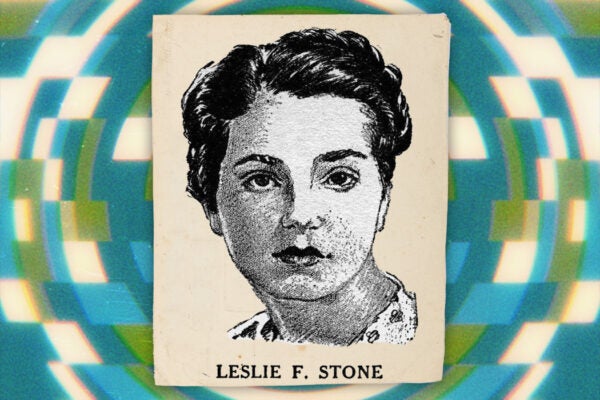She wore an iconic red coat to stand out, both in the newsroom and out in the field. She was swindled out of more than fifteen hundred dollars for her works of fiction. She represented a major newspaper at a conference given by existentialist philosopher Jean-Paul Sartre. She was The New Yorker’s on-the-scene reporter when the worst student-worker riots in recent history broke out in Paris. She was the inspiration for one of Wes Anderson’s characters in his 2021 film The French Dispatch. She wrote on everything she witnessed and explored everything that couldn’t be seen. She was bilingual, speaking French and English. She was fearless. She was Canadian. She was Mavis Gallant.
Mavis Gallant was born in Montreal on August 11, 1922. Her parents split when she was young, and she was so neglected by her disinterested and emotionally unavailable mother that at one point she was deposited as a boarder in a convent school just down the street from her house. Self-reliant by necessity and possessing a unique talent for sharp, memorable verse, she found her own way in her young adulthood as a reporter for The Montreal Standard, a weekly newspaper which (reluctantly) took her on as an inexperienced feature writer as World War II plunged Quebec into a labor shortage crisis.
In this role, she thrived and more than exceeded expectations. Thirty-eight of the stories she wrote for the Standard have been collected in Montreal Standard Time: Mavis Gallant Early Journalism (2024), including her March 16, 1946, attendance of Sartre’s conference. The article’s final line, “Mr. Sartre said he didn’t know,” comes across as a cheeky dig at a man who seems to have all the answers. That was how she stood out as a writer. By daring.
Gallant was also a powerhouse author of short stories. This, plus her naivete, made her the target of one of American literary history’s most conniving con artists. As she explained in a 2000 interview with Pilar Somacarrera Íñigo, her so-called literary agent Jaques Chambrun sneakily squirreled away what was supposed to be a $1,535 payout for short stories accepted by The New Yorker. Telling her that her submissions had been rejected and giving a false address for the magazine, Chambrun was able to get away with it—until Gallant stumbled across one of her stories while perusing The New Yorker at the American Library in Madrid, Spain, in 1952.

Thankfully, she reached out to The New Yorker, she told Somacarrera Íñigo, and the magazine forwarded her an advance on her future work. The New Yorker would publish more than a hundred of Gallant’s stories, all of which tended to favor edgy themes for the times, with the most notable subject matter being what was tearing the world apart at the time: the psychological impact of fascism, Nazism, and the Holocaust.
“It is permeated with references to nationality and race,” writes Mary Condé in an analysis of Gallant’s short story “Malcolm and Bea,” which concerns two families in post-World War II France contemplating French Jewish history and its parallels to their precarious, politically unstable lives. “In the first paragraph the Englishman Malcolm Armitage, in France with NATO, identifies children at play as American, and he himself is identified as ‘not French.’” It is a story of “Jewish experience,” Condé confirms, but one that, thanks to Gallant’s writing, brilliantly inserts the “illogical and self-interested interpolations of individuals into a clear and rational discourse on history,” presenting the reader with characters that would be described as “unreliable narrators” in the twenty-first century.
Weekly Newsletter
As Gallant said to Somacarrera Íñigo, her writing couldn’t be separated from sociopolitics. When asked why “When We Were Nearly Young,” a story set in Francoist Spain, where people “lived on the thought of money,” turned out to read as much like an essay as a story (Somacarrera Íñigo compares it to George Orwell’s writing in Homage to Catalonia), Gallant supposed that it came down to her “journalist background.” Living with little money in Madrid herself, she was “very close” to the setting and the spirit. As she pointed out,
there is a desire to impart information which I have. In addition, I can’t imagine writing except within a sociological context. I can’t imagine writing “he said, she said.” I want to know who he is, who she is, what sort of café they are in, and what time of day it is, what’s going on around them. If I don’t find that, I’m not interested in reading, I want all that.
And as a successful, award-winning writer, she got all that, and moreover, she gave it to her readers.
Support JSTOR Daily! Join our membership program on Patreon today.







